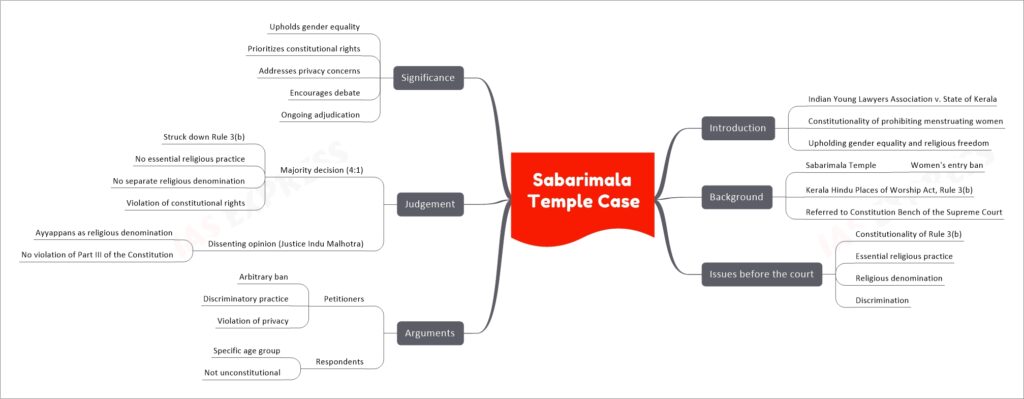Indian Young Lawyers Association v. the State of Kerala (2018) – Upholding Gender Equality and Religious Freedom
The Indian Young Lawyers Association v. the State of Kerala (2018) case, also known as the Sabarimala Temple case, revolves around the constitutionality of prohibiting women of menstruating age from entering the Sabarimala Temple in Kerala, India. The Supreme Court of India was called upon to evaluate the validity of this ban and its compatibility with the Indian Constitution. The landmark judgement resulted in a majority decision to strike down the ban as unconstitutional, upholding gender equality and the right to religious freedom.
Background:
- Sabarimala Temple: Hindu temple in Kerala, India, devoted to Lord Ayyappan
- Women’s entry ban: Prohibition of women aged 10-50 years from entering temple
- Basis: Menstruating women considered impure, temple dedicated to celibate deity
- Kerala Hindu Places of Worship (Authorisation of Entry) Act, 1965 (KHPW Act): Rule 3(b) prohibited women of menstruating age from entering temple
- Referred to a Constitution Bench of the Supreme Court for review
Issues before the court:
- Constitutionality: Assessing the constitutionality of Rule 3(b) of the KHPW Act
- Essential religious practice: Whether the ban constitutes an essential religious practice
- Religious denomination: Whether the temple has a denominational character
- Discrimination: Whether the practice violates Articles 14, 15, 17, 21, and 25 of the Constitution
Arguments:
- Petitioners: Argued the ban is arbitrary, discriminatory, and violative of women’s right to privacy
- Respondents: Argued the ban doesn’t deny entry to all women, only a specific age group, and is not unconstitutional
Judgement:
- Majority decision (4:1): Rule 3(b) of the KHPW Act struck down as unconstitutional
- No essential religious practice: Exclusion of women not based on scriptural or textual evidence
- No separate religious denomination: Devotees of Lord Ayyappa part of the Hindu fold
- Violation of Articles 14, 15, 17, 21, and 25: Ban infringes on dignity, freedom, and autonomy of women
- Dissenting opinion (Justice Indu Malhotra): Ayyappans are a religious denomination, protected by Article 26, and the ban doesn’t violate Part III of the Constitution
Significance:
- Upholds gender equality: Supports the right of women to enter religious spaces
- Constitutional rights prioritized: Emphasizes the importance of constitutional rights over religious customs
- Addresses privacy concerns: Recognizes the menstrual status of a woman as part of her privacy
- Encourages debate: Stimulates discussions on the balance between religion and state
- Ongoing adjudication: Case referred to a larger bench for further consideration
This article is part of the series “Landmark Judgements that Shaped India” under the Indian Polity Notes & Prelims Sureshots. We aim to make the articles comprehensive while leaving out unnecessary information from the UPSC perspective. If you think this article is useful, please provide your feedback in the comments section below.


